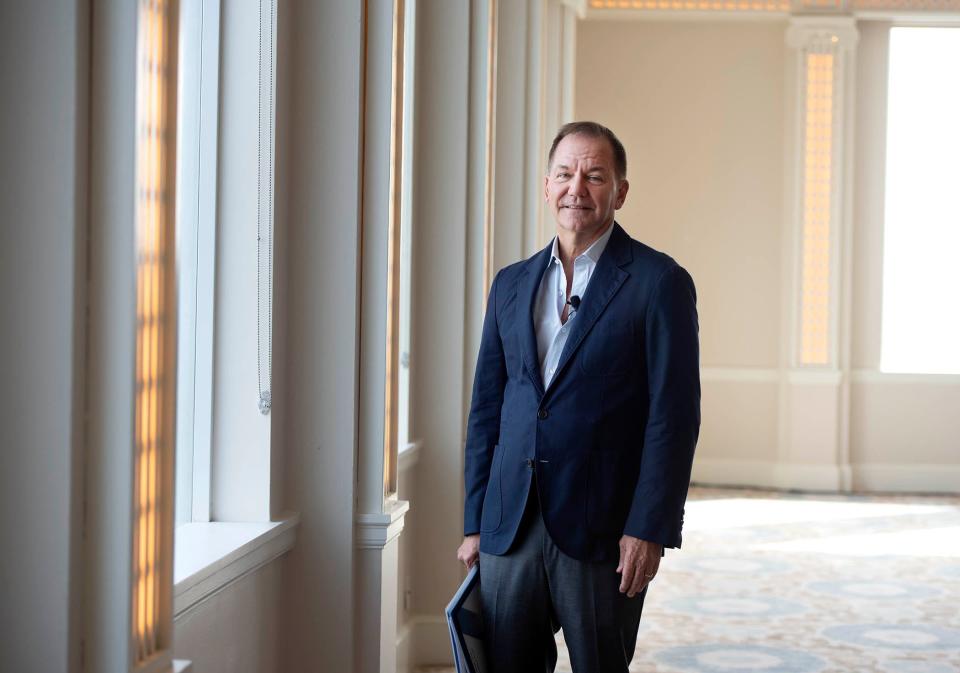Billionaire hedge fund manager says U.S. economic future remains uncertain

- Oops!Something went wrong.Please try again later.
If the U.S wants to tackle its ever-mounting debt, significant policy changes will be required, including the expiration of former President Donald Trump’s 2017 tax cuts, a billionaire hedge fund manager said last week.
“That only leaves us with another trillion that we have to fight to stabilize our debt,” Palm Beach resident Paul Tudor Jones II said to the Palm Beach Civic Association on Thursday at The Beach Club.
Jones, the founder of Tudor Investment Corporation and PBCA's director, spoke to the crowd of roughly 120 of a bleak economic future, regardless of whether Republican front-runner Trump or President Joe Biden is elected.
He said under Trump, voters can expect the owner of the Mar-a-Lago Club to pressure the U.S. Federal Reserve into significantly cutting lending rates, kicking off an inflationary period similar to that of the late 1970s. During the late 1970s, inflation rates soared as high as 13.3%. The current inflation rate sits at 3.4%, down from 9.1% during the summer of 2022.
"That's the classic way that you deal with overly indebted countries. You inflate your way out," Jones said. He said this option would incentive short-term gains, and lead to an active, but volatile stock market.

On the other hand, he says under Biden, the U.S. will most likely commit to traditional austerity measures enacted, including increased taxes, cuts to public spending that would "slam" the economy in the short term, but secure long-term stability.
"In the long run, that's probably the best way. It's short-term pain for long-term gain," he said to moderator Michael Pucillo, the chairman and CEO of the PBCA.
"And (it will) keep everything where we have longevity for those wonderful kids in the front row," referring to the Suncoast Community High School students who led the event's Pledge of Allegiance.
Tudor says A.I. may save the economy, but may cost countless workers their job
Jones' financial insights first drew notice more than 30 years ago when his firm predicted the global "Black Monday" stock market crash of Oct. 19, 1987. Forbes magazine in 2019 estimated his wealth to be $5.3 billion.
Besides managing a hedge fund, he is a philanthropist whose work includes co-founding the Everglades Foundation and the Robin Hood Foundation, a charitable organization driving efforts to reduce poverty in New York. His remarks were part of the association's Signature Speaker Series.
Jones said the differences between Trump and Biden come down to different economic priorities. Trump's policies, he said, favor short-term gains with the hope of "growing our way out" of economic hardship.
Looking at the options strictly through the lens of an investment manager, he admitted he would most likely prefer trading under Trump's predicted policies, though he doubted their effectiveness in countering the nation's debt. He compared Trump's love for tax cuts to holiday drinking.
"It's like being at a Christmas party and saying, 'I'm just going to have one shot of tequila, just one.' It just doesn't happen like that, right?" he said, to chuckles from the crowd.
Instead, Jones said he recommends policies for combatting the debt with a slew of wide-ranging policies. Beyond allowing Trump's tax cuts to expire, his proposals included:
Increasing the corporate tax rate to 25%.
Increasing the federal payroll tax by 1%.
Removing the current $160,000 cap on employee pay that can be subjected to Social Security payroll taxes.
Introducing a carbon tax.
Making changes to Social Security and Medicare, including raising the age for Social Security benefits to 70.
He also recommended changes that would target the ultra-rich, saying that the U.S. could either increase the marginal tax rate to the "super wealthy" to 70%, increase the top marginal tax rate for those earning more than $108,000 to 50% or introducing a wealth tax of 2% and 3% for those making over $50 million and $1 billion respectively.
However, even with all this, he said the U.S. still faces an uphill battle.

"All these things together will stabilize debt at 125% of GDP," Jones said.
Though the current U.S debt-to-GDP percentage rests at about 120%, according to the Federal Reserve Economic Data online database, Jones believes that it is bound to increase under current government expenditure patterns.
However, Jones said there's hope with the rise of artificial intelligence, noting the rising stock value of the group of tech companies known as the "Magnificent Seven": Alphabet (i.e. Google), Amazon, Apple, Meta Platforms (Facebook and Instagram), Microsoft, software company Nvidia and Tesla.
That's without discussing the productivity boost that AI can bring to companies, which he said could create an economic boom in the same vein as the introduction of personal computers into the U.S. workforce.
However, he also warned that the boom in productivity could be accompanied by a 30% loss in white-collar and tech-based jobs. Though he didn't cite his source, a 2017 McKinsey & Company report predicted jobs to drop by the same percentage by 2030.
What makes this especially alarming, Jones said, is how it will affect wealth inequality, an already staggering problem in the United States. As of the first quarter of 2023, the top 10% of earners in American's own 66.6% of the total wealth in the U.S., while the bottom 50% own 2.6% of the wealth.
"A country's social harmony is a direct reflection of the wealth gap between the top 10% and the bottom 20%," he said.
Moreover, he said that regardless of the U.S. effort to reduce the percentage of those in extreme poverty, what matters to the population is relative wealth — that is, how their economic standing compares to top earners. "So how we distribute the productivity gains is going to be another social challenge for this country," he said.
Jones said business leaders must take charge in addressing economic and social change. "So, if we're really going to fight poverty,; if we're going to fight society's ills, it really has to involve the corporate sector," Jones said. "How we conduct ourselves in business (and) how businesses conduct themselves."
The Signature Speaker Series are sponsored by the Stanley M. Rumbough, Jr. Legacy Society through a donation from the late Cynthia Van Buren. A completing this year's series will be Feb. 25 keynote lecture featuring David Rockefeller Jr., business executive, philanthropist and conservationist, hosted at The Beach Club. The Signature Series is open to any Civic Association members at the giving level of $1,000 and above. For more information on the upcoming lecture or to RSVP, call 561-655-0820 or visit palmbeachcivic.org/events
Diego Diaz Lasa is a journalist at the Palm Beach Daily News, part of the USA TODAY Florida Network. You can reach him at dlasa@pbdailynews.com. Help support our journalism. Subscribe today.
This article originally appeared on Palm Beach Daily News: Civic Association speaker warns the U.S economy's future is uncertain

